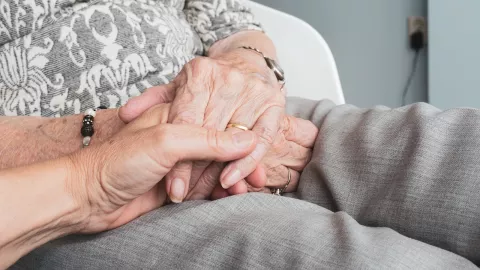
Ageing and MS
Around the world, about 1 in every 10 people living with MS are over 65.
We asked our MS nurses, Razia, Jen and Liz, about some of the issues people raise as they get older with multiple sclerosis.
Is MS different after 65?
MS doesn’t suddenly change because of age. But people with MS tend to have more symptoms as time goes on. And lots of people have lived with MS for decades by the time they reach their 60s.
Not everyone will have progressive MS, but any lingering effects from relapses can also build up over the years.
Bodies change with age
And like anyone else, bodies change with age. So we need to keep in mind that certain symptoms of MS might start to have some crossover with old age. For example, as we get older we have less muscle strength, often more urgency to go to the toilet, or reduced memory and attention.
We’re more likely to have other health conditions as we get older, like diabetes, arthritis and cardiovascular disease, for example.
It makes it all the more important to raise things with your MS team or GP if you notice a change. Investigating the likely cause can help you manage it better. And that includes your mental health, which is often overlooked in older people.
Family, friends and carers
If you have someone close who helps with everyday activities, they might also be getting old. As health care professionals, we want carers to tell us if they need support too – whether that’s to help them stay healthy themselves, or seeing if there’s a way to find extra support.
Does age change how someone manages their MS?
There’s some research that suggests lots of people feel more confident about managing their MS as they get older. For example, because as they understand their MS more, they can focus on what’s important to them.
It’s more common as people with MS get older to face challenges with everyday activities like bathing, dressing and getting out and about. But if they’ve managed their MS for many years, some people say they feel more equipped to deal with things.
General health and wellbeing
Part of managing MS as you get older is about staying on top of general health and wellbeing. That’s true at any age, but sometimes the ageing process makes it seem more obvious.
Let your doctor or MS team know about new symptoms. Don’t dismiss things as ‘just getting older’. And try to stay as active as possible. Ideally, with the help of a physiotherapist. But we’ve also got lots of activity videos on our website. Our MS Helpline can give you information on staying active. And you might find things you can do online or your local area.
Do older people with MS tell you about particular worries?
Sometimes people with MS have particular worries about getting older. For example, worries about being isolated if they’re a long way from family. Or, on the other side of that, feeling like a burden to loved ones close to them.
People are often worried about losing their independence. And there are things which could help with that.
Planning ahead
Planning ahead can help people to feel more in control. For instance, involving others in thinking about what you might change around the home to stay mobile and make everyday tasks easier. That’s where an occupational therapist might come in handy.
It’s good to know what would happen if your usual routine is disrupted. That could be little things like having the number of an accessible taxi company if the car won’t start. Or it could be an emergency plan with social services in case your usual carer is unwell.
It also helps to keep social connections going - including working on relationships with those closest to you. And whether you’re connected to people online or face to face, the best activities are ones you find rewarding and enjoyable. Things that bring you joy.
Are there things that seem to make a difference to ‘healthy ageing’?
Research suggests certain things help people live well with MS as they get older. We’ve mentioned some of these things already, like having good social connections and staying in touch with care providers.
But research has also found people’s outlook on life and their lifestyle could make a positive difference.
This isn’t saying ‘don’t worry, be happy’. Being positive and determined helped, but people also felt more able to accept and deal with any limits on what they could do. Together these things seem to help older people live well with MS.
Self care
We don’t all have the same choices when it comes to lifestyle. But some of the ‘healthy habits’ which might help include managing your treatments and ‘self care’. Self care is being good to yourself, like eating well, doing things you enjoy, and finding time for yourself. For some people it includes mindfulness or meditation.
What is ‘brain health’ – and can we do anything about it?
‘Brain health’ is how well our brain works for memory, planning, learning and concentrating. Getting older and MS can both affect brain health. That’s because these things cause changes in the brain which can't be repaired. As we get older we can’t avoid changes to our brain completely. But there are things which might help to slow down the changes and keep our brains as healthy as possible. These are healthy habits at any age, so worth starting even when we’re young.
For example, keeping as fit and active as you can, not smoking, and keeping your mind active with puzzles, reading or being creative. If you’re finding it hard to sleep, tell your doctor or MS team so they can help find ways to improve your night’s rest. And it’s worth mentioning again that social activities can help keep your brain and body active.
There are also ways to manage the effects on memory and thinking right now.
Where can I find out more about getting older with MS?
The MS International Federation has just produced a free guide to living well with MS as you get older. It includes tips for looking after your overall health and wellbeing mentally and physically.




